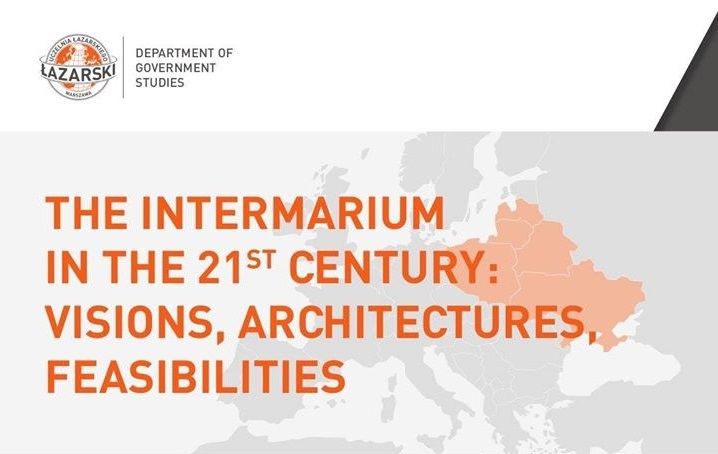Intermarium in the 21st century
On July 6-7 2017, Lazarski Unviersity in Warsaw organised and hosted a conference titled: “Intermarium in the 21st Century: Visions, Architectures and Feasibilities”. This international gathering brought together Central and Eastern European scholars to examine the diversity of interpretations of the Intermarium concept and assess chances for its various configurations to come into being. The conference focused on the nature of Intermarium as well as debated the feasibility of its geographic, political, economic, cultural and security dimensions.
July 5, 2017 -
New Eastern Europe
-
Intermarium

As a partner of the event New Eastern Europe has agreed to republish some of the main contributions to the conference in the aim to further the debate surrounding the idea of Intermarium, especially in the context of the new “Three Seas Initiative”.
Together with Lazarski University we present the following pieces from the conference:
Warsaw debates Intermarium
Jonathan Hibberd
It was appropriate enough that Warsaw should host a conference on the theme of Intermarium, the idea being primarily of Polish origin and promoted heavily by Polish interwar leader Józef Piłsudski, who believed that rebuilding Polish independence was not the sole action of one country and that is was in the interests of a chain of independent states to pool their aspirations
How to embed Ukraine? The idea of an Intermarium coalition in East-Central Europe
Kostiantyn Fedorenko and Andreas Umland
Neither the EU nor NATO will any time soon be able to fill the security vacuum they have left with their hesitant policies in the grey zones of Eastern Europe and the Southern Caucasus. Against this background, some post-Soviet politicians, diplomats and intellectuals are starting to discuss alternative options. The most prominent among these concepts is the creation of a so-called “Intermarium coalition”.
 Why great national ideas end up on the backstage of regional politics
Why great national ideas end up on the backstage of regional politics
Ostap Kushnir
In the post-Versailles era, Polish leader Józef Piłsudski proposed to Ukraine, Lithuania and Belarus an Intermarium union for the survival of their states. Piłsudski risked and pushed forward an intellectual speculation on how to strengthen the “young” states in games between major powers. From the perspective of time, this speculation can hardly be defined as a real-life success.
 Intermarium vs the Three Seas Initiative
Intermarium vs the Three Seas Initiative
Daria Nałęcz
The Intermarium strategy was developed in Poland as a political doctrine at the turn of the 20th century. It was an attempt to answer the general question on how to rebuild a sovereign Polish state and how to secure its future. When a new idea, the so-called Three Seas Initiative, appeared in 2015 and was followed by two summits, the old Polish strategies began to once again emerge.
 Intermarium – A view from Germany
Intermarium – A view from Germany
Jan Menzer
Several Eastern European politicians have recently been bringing up the idea of an Intermarium anew. What does this mean for Germany? Would it bring more security for Ukraine or other countries in the so-called “grey zone” between Europe and Russia?
Trimarium is not Intermarium
Dariusz Góra-Szopiński
With US President Donald Trump’s visit in Poland, the brand of the Three Seas Initiative gained international reputation. In Poland where the roots of the initiative began, the Three Seas or – as one can Latinise it, Trimarium – initiative is often confused with the historical project of Intermarium, intuitively understood by many.
 Sovietisation and post-Soviet development in the Intermarium
Sovietisation and post-Soviet development in the Intermarium
Michał Kuź
Careful observation of Central and Eastern European history points to the fact that the two decades between the end of the First World War and the Munich Conference were critical for nation-state formation in that region due to the collapse of the two imperial hegemons – the Austro-Hungarian Empire and Tsarist Russia.
 Relations between Visegrad and the UK in a post-Brexit Europe
Relations between Visegrad and the UK in a post-Brexit Europe
Simon Massey
As a result of a close affinity with the UK’s customary Eurosceptic attitude, and as a practical consequence of sizeable numbers of their citizens living in the UK, the V4 states have a strong incentive to act together to influence the Brexit negotiation process. Yet, beyond the Brexit negotiations lies a wider debate over the future of the EU after the UK’s withdrawal.
 For Russia, the war has never ended
For Russia, the war has never ended
Nataliia Steblyna
Every year on May 9th, nostalgic people from the post-Soviet republics can feel like Soviet citizens again. The slogans and posters from the Second World War inspire them just like “make America great again” has inspired Donald Trump’s voters.
 Shifts of FDI – a lesson for Ukraine?
Shifts of FDI – a lesson for Ukraine?
Tomasz M. Napiórkowski
The role of foreign direct investment, or FDI, as an accelerator of economic growth of the receiving country is difficult to dispute. These benefits include the increase in the level of investment, higher wages, transfer of technology, transfer of know-how, etc. Therefore, it is in the best interest of a country to attract such investments. This is especially true for developing economies.



































